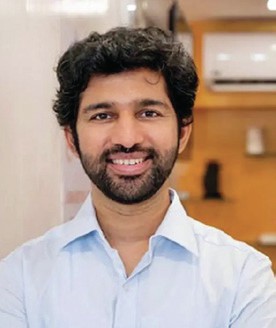EMBRACING INCLUSIVITY
Hemarani Aushat emphasises on inclusive practices in dermatology, aesthetics, and cosmetology for the LGBTQ+ community.
Hemarani Aushat
In today’s diverse society, dermatologists, aestheticians, and cosmetologists must cultivate an inclusive environment that caters to the unique needs of all individuals, including the LGBTQ+ community. By offering support and specialised treatments, professionals in these fields can empower individuals undergoing gender reassignment, seeking laser hair treatments for facial hair, or exploring non-invasive procedures to enhance their appearance. Let us delve into the importance of inclusivity and how these practices can support the LGBTQ+ community.
EDUCATION AND TRAINING
To better serve the LGBTQ+ community, medical professionals must invest in ongoing education and training to understand the specific concerns and needs of transgender and non-binary individuals. This includes:
• Staying informed about the latest research and medical advancements related to transgender healthcare, hormone therapy, and gender-affirming procedures.
• Participating in workshops and training sessions that focus on LGBTQ+ cultural competency, sensitivity, and terminology.
• Collaborating with LGBTQ+ organisations, support groups, or local community centers to gain insights and foster relationships that can enhance patient care.
CREATING SAFE AND INCLUSIVE SPACES
It is essential to create a welcoming and inclusive environment within medical practices. Here are some steps medical professionals can take:
• Implementing LGBTQ+ friendly policies and nondiscrimination statements explicitly mentioning sexual orientation, gender identity, and gender expression.
• Displaying inclusive signage, such as rainbow flags or genderneutral restroom signs, to signify a safe and welcoming space.
• Training staff members to use inclusive language and to treat all patients with respect and dignity, regardless of their sexual orientation or gender identity.

Navya Singh
“As a transwoman, I underwent facial feminisation surgery with Dr Pink Joshi, a renowned cosmetologist in Andheri. I was impressed with her vast knowledge about the facial structure and definitions of a transgender,”
Navya
Singh, a patient of Dr Joshi says. “She was compassionate, supportive, and committed to ensuring that my unique needs and preferences were met. Dr Joshi also offers discounts to transgender individuals for procedures like facial feminisation, botulinum toxin, and laser hair treatment. “She is a great example of a skilled and inclusive healthcare provider in dermatology and cosmetology.”
ESTABLISHING TRUST AND CONFIDENTIALITY:
Building trust with LGBTQ+ patients is paramount for effective care. Professionals should prioritise the following:
• Maintaining confidentiality and privacy at all times, ensuring that patients feel comfortable discussing their concerns openly.
• Using appropriate pronouns and gender-neutral language when communicating with patients in person and through documentation.
• Taking the time to actively listen to patients, allowing them to share their experiences, goals, and concerns without judgment or assumptions.
Sharing her experience about inclusivity, Dr Priti Shenai says, “As a dermatologist, I believe that inclusivity is one of the most important values that we must uphold in our practice. When it comes to serving the LGBTQ+ community, it is important to understand that hormone therapy can leadto a variety of dermatological conditions like acne and hair thinning.” She adds that that is why she offers a range of treatments to help address these issues, including acne treatment, chemical peels, laser resurfacing, and laser treatment for post-inflammatory hyperpigmentation. “We also offer treatments for androgenetic alopecia, such as PRP therapy, as well as laser hair removal and treatments for folliculitis. Overall, our goal is to provide highquality care and support to all of our patients, regardless of their gender identity or sexual orientation.” Dr Priti strongly believes in offering a supportive and non-judgmental environment where the patients can openly discuss their concerns and receive unbiased guidance from her and her staff with a level of comfort.

Dr Priti Shenai
CULTIVATING REFERRAL NETWORKS
Medical aesthetic professionals should develop strong referral networks to connect patients with LGBTQ+ affirming healthcare providers, support groups, and mental health professionals. This collaborative approach ensures comprehensive care and support for patients throughout their healthcare journey.
We approached Dr Rickson Pereira, renowned dermatologist and aesthetic physician, for his opinion on the subject, and here’s what he had to say: “As a healthcare professional with a focus on dermatology, aesthetics, and cosmetology, I firmly believe that there are crucial steps we can take to better serve and support the LGBTQ+ community. In my practice, I prioritise respect, cultural competency, personalised care, access to care, education, and advocacy.

Dr Rickson Pereira
• Firstly, it is essential to incorporate LGBTQ+ content into education and training programmes, ensuring that healthcare providers know about the community’s unique health needs and challenges they faces.
• Secondly, promoting diversity and inclusion in our marketing materials and social media content is vital. By featuring LGBTQ+ individuals and representing a range of gender identities and expressions, we create a more welcoming and relatable environment.
• Thirdly, expanding our services to include gender-affirming treatments and procedures is crucial. This could involve specialised skincare regimens for individuals undergoing hormone therapy or addressing specific concerns related to gender transition.
• Lastly, advocating for LGBTQ+ rights and partnering with LGBTQ+ organisations strengthens our commitment to the community. By supporting policies and legislation and collaborating with organisations that provide specialised support, we can ensure that LGBTQ+ individuals receive the highest quality of care and support throughout their healthcare journey.”
We also took an opinion from a transwoman who underwent sex reassignment surgery – Navya Singh. She is India’s first transgender woman to become the brand ambassador of Ms Transqueen India in 2022. She is an actor, a tarot reader and a motivational speaker. Here’s what she shared: “The biggest challenge I faced was finding a specialist in India renowned for sex reassignment surgery. Sadly, many in our community lack knowledge about these procedures. There are different types of surgeries, like penile inversion, sigmoid inversion, and paratonian inversion, leaving people confused about the best option for them. I, too, was uncertain but did extensive research and finally chose sigmoid colon surgery, which I am pleased with.” However, during her search, she encountered renowned doctors in Delhi and Mumbai making misleading claims of instant satisfaction within 10 days post-surgery. “Let me tell you; it takes a good six and eight months to feel some sense of normalcy, with the initial three months solely dedicated to healing. So, I kindly request those doctors making such videos to avoid misleading the community.” She gives a shoutout to Dr Tapeshwar Sehgal from Delhi, who advised her to abstain from smoking and drinking three to four months before surgery and was a great support during her entire journey. She says, “Educating patients about these precautions is crucial to prevent future health complications.”
Now, let’s talk about hormone replacement therapy (HRT). It is an essential step before gender-affirmation surgery, and skipping it can adversely affect mental and physical health. Transitioning from male to female requires not just physical changes but also mental and emotional preparation. Please, emphasise the significance of HRT for two to three years and consultation with an endocrinologist to determine surgery eligibility.
Facial feminisation surgery is another critical aspect. Transgender women need the expertise of cosmetologists, dermatologists, or aestheticians who understand their unique needs. Remember, reputation does not always guarantee satisfactory results. It is your responsibility to provide accurate information, discuss potential side-effects, and explain the pros and cons of treatments. Patients seeking facial feminisation or other procedures must be educated about the transformation process, both physically and psychologically.
Together, please provide comprehensive care and empower the LGBTQ+ community throughout their journey of self-discovery.
In conclusion, creating an inclusive and supportive environment within dermatology, aesthetics, and cosmetology practices is essential for better serving the LGBTQ+ community.
Non-invasive cosmetic procedures can help individuals express their true selves and enhance their features. Professionals in dermatology, aesthetics, and cosmetology can provide a range of treatments to address the specific concerns of the LGBTQ+ community:
• Facial contouring and augmentation: Utilising dermal fillers or other techniques to sculpt the face, enhance cheekbones, or provide a more feminine or masculine appearance.
• Lip enhancement and shaping: Tailoring lip augmentation procedures to achieve the desired outcomes, considering individual preferences and facial symmetry.
• Skin rejuvenation and anti-aging treatments: Customised treatments, such as chemical peels, microdermabrasion or nonsurgical skin tightening, can help individuals maintain youthful and healthy-looking skin.
• Facial hair: Unwanted facial hair can be a source of distress for many transgender and non-binary individuals. Laser hair treatments offer an effective solution and contribute to their overall well-being.
• Tailored treatment plans: Offering personalised protocols that consider individual skin types, hair colours, and hormonal influences can help achieve optimal results while prioritising the client’s comfort.
• Price sensitivity: Given that such therapies and procedures are not pocket-friendly, practitioners can reconsider pricing packages for more individuals to walk out of their closets.
Let us strive for a future where all individuals, regardless of sexual orientation or gender identity, can access quality healthcare and cosmetic services with dignity, respect and inclusivity.
About the author:
Hemarani Aushat
is the CEO & Founder of Argus CMPO Brand & Marketing Consultants.